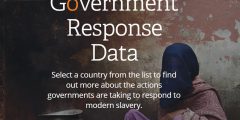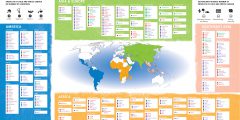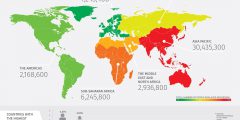Sound Evidence to End Slavery
November 25, 2017
By Professor Todd Landman There are 40.3 million people enslaved around the world today, a shocking figure that, in recent times, has given birth to a renewed global commitment to end modern slavery. Ending slavery by 2030 is now a key Sustainable Development Goal target and slavery is a focus for the UK government. There can’t be many people …
Survivors’ Solutions: The Value of Survivors’ Voices in the Antislavery Movement
October 27, 2017
By Andrea Nicholson Slave narratives have long been a valuable tool in abolitionism; the pamphlets, papers, art, lectures and writings by abolitionists, slaves and amanuenses during the 19th century were central to galvanising the abolitionist movement and effecting change. These collections continue to inform our perspectives of slavery today, with historic narratives providing a basis …
Introducing the Rights Lab
August 4, 2017
By Zoe Trodd Almost 46 million people are enslaved around the world today. But we’re in the middle of history’s fourth great antislavery movement. We have a global commitment to ending slavery by 2030, as part of the Sustainable Development Goals, and a deep commitment from the UK government, in the new Modern Slavery Act. …
Global Research for Global Problems: Government Responses
July 15, 2017
By Emily Brady Working on the Walk Free Foundation’s government response database is a fascinating, thought-provoking, and troubling experience. As a researcher going from knowing relatively little about the global situation of modern day slavery to spending several months conducting detailed research into the topic, I was exposed to just how extensive this global problem is, and …
Slavery from Space
June 1, 2017
By Bethany Jackson and Dr. Jessica Wardlaw Modern slavery remains a pressing human rights issue, with the latest Global Slavery Index (2016) estimating that 45.8 million people are currently enslaved globally. India alone accounts for over 18 million affected individuals, in industries ranging from domestic work and construction to agriculture and quarrying. Efforts to eradicate …
How do we build capacity in the field of antislavery?
April 20, 2017
By Professor Kevin Bales, CMG We all want to end slavery, but how? We all want to support freed slaves, but how? Sooner or later everyone in the world of human rights, anti-trafficking, and anti-slavery asks these questions. These questions spring up whenever we wrestle with the tough challenges of liberation and reintegration. Around the …
Advancing supply chain management for the challenges of Modern Slavery
April 12, 2017
By Dr Alexander Trautrims Supply chains that compete solely on price with little opportunity to differentiate from the competition or to compete on value-added propositions, are almost naturally drawn towards modern slavery and other unethical labour practices. This is particularly the case for industries where low skill labour is a key resource and in places …
Thinking globally, acting locally: is local public policy anti-slavery’s missing link?
March 23, 2017
By Dr. Alison Gardner In July 2016, UK Prime Minister Theresa May promised to ‘flex the muscle of all parts of the UK Government’ in eradicating modern slavery. Yet whilst her government seeks to ‘get a real grip’ on policy at a national level, there has been minimal focus in the UK on the potential …
Innovation – Evolution – PARTNERSHIP!
March 3, 2017
By Professor Kevin Bales CMG Every great change begins with an idea and a start-up, whether it is the transformation of the world through computer technology, or the beginning of the end of slavery. All start-ups evolve in a challenging environment, and in time those that survive and prosper tend to join together – maximising …









